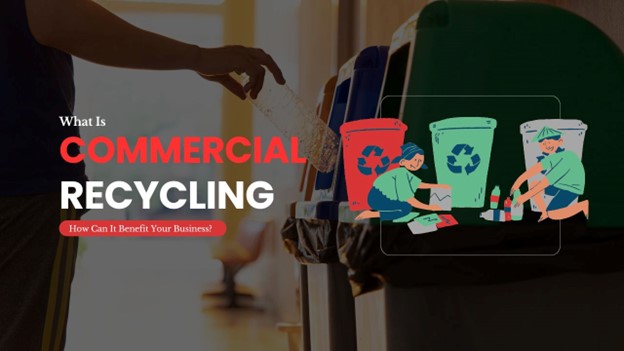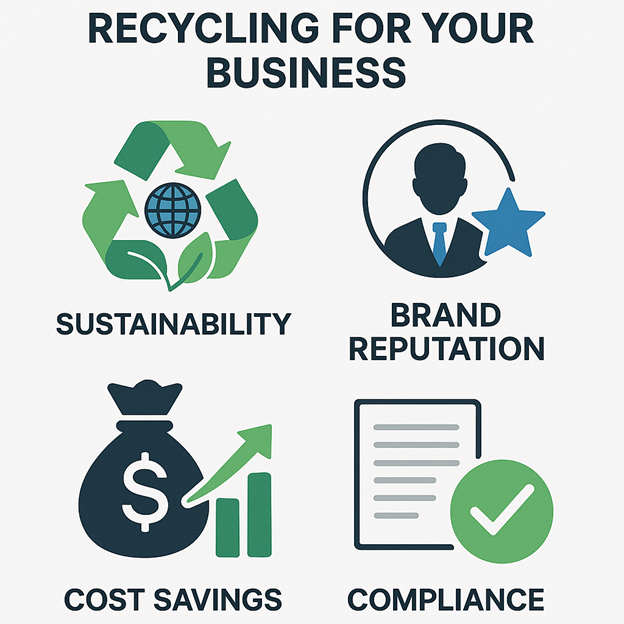

Commercial recycling helps businesses cut costs, improve sustainability, and comply with regulations.
Commercial Recycling: Benefits for Your Business
Discover how commercial recycling can cut costs, boost your brand, and meet regulations. Start your business sustainability journey today.
/commercial-recycling-benefits-business

In today’s fast-evolving eco-friendly society, businesses are constantly pressuring them to sustain their sustainability. Recycling, while amongst the most widely recognized and comprehensive methods for companies to operate sustainably, is a very effective and easy way to commit to the latter. Replacement for small commercial establishments or large businesses in implementing recycling, every commercial entity is faced with some very profound benefits-ranging from cost savings, compliance, and enhanced customer loyalty to brand reputation and societal responsibility.
With the growing awareness prevailing among consumers, stakeholders, and regulators, this is an opportune moment for a discussion on how commercial recycling can align your business with a greener tomorrow. As we proceed with this blog, we will discuss what commercial recycling is all about, its advantages for the business and establishment of its program, and how a partner like AGOC can set up an intelligent and scalable solution.
Commercial recycling refers to the process where businesses and organizations collect, process, and repurpose waste materials instead of sending them to landfills. Unlike residential recycling, commercial recycling deals with larger volumes and more diverse materials like industrial waste, packaging, and electronics.
Example: A logistics company might recycle pallets, cardboard boxes, and shrink wrap instead of discarding them. This helps reduce costs while supporting eco-friendly practices.
Adopting a recycling program isn’t just good for the planet—it’s a smart business strategy. Here’s why:
Example: A co-working space in New York attracted eco-minded startups after implementing a comprehensive recycling initiative. It became a marketing point and a cultural shift for tenants.

A company reduces its cost associated with the transportation of waste and taxes of landfills when recyclable wastes are collected and processed against dumping them in the landfills. Outside its savings from lower hauling, it can even generate revenue from the sale of some recyclable materials-such as metals, paper, or electronics third-party vendors.
For example, include a restaurant chain that saved $12,000 annually by recycling cooking oil and paper waste and reinvesting the savings in employee training programs.
Over time, businesses that recycle can reduce the frequency of waste pickups, which, when multiplied over the years, becomes thousands in savings. Mass recycling of waste industrial materials, such as scrap or packaging, could even start being a new source of revenue through sales to specialized recycling centers.
Consumers and clients have an affinity for a business with a green footprint. It makes a business attractive both to customers and to their trust and customers’ loyalty. Recently, many B2B partners have begun to prefer suppliers as long as their suppliers’ standards align with their way back to their interests in ESG.
For example, a tech company endorsed recycling and included such messages in marketing initiatives, and earned a 20% hike in customer patronage among the younger demographic consumers.
Expanded Insight: Sustainability indexes include organizations that tend to demonstrate green character, thus most likely attracting investors. Also, sustainability initiatives in hospitality or retail have proven to determine how positive customer reviews fare and boost their sales.
Many regions now mandate recycling for certain industries. Being proactive helps you avoid penalties and demonstrates responsible corporate behavior. These laws are becoming more rigorous, especially in sectors dealing with hazardous or electronic waste.
Example: A manufacturing company avoided hefty fines by complying with local e-waste recycling laws and maintained a strong relationship with regional regulators.
Expanded Insight: Compliance is not just about avoiding penalties—it also makes your business future-proof. As new sustainability legislation rolls out, having an established recycling program allows for seamless transitions and quick adaptation to new standards.
When employees see that their workplace is committed to sustainability, they’re more likely to feel proud of where they work. A well-executed recycling program can foster a sense of purpose and collective responsibility.
Example: A marketing agency implemented a recycling challenge between departments, which led to a 60% increase in recycling participation and improved internal team morale.
Expanded Insight: Studies show that companies with strong sustainability practices often experience lower staff turnover. Employees want to be part of companies that care about more than just profit—they want their work to have meaning.
Green certifications like LEED or ISO 14001 can distinguish your business from competitors and unlock government or tax incentives.
Example: A commercial office building achieved LEED Silver certification after implementing energy and waste management strategies, including a robust recycling plan. The recognition helped attract high-profile tenants looking for environmentally responsible spaces.
Expanded Insight: Many local municipalities offer grants, rebates, or tax incentives for businesses that adopt sustainable waste management practices. A recycling initiative can be the first step toward broader sustainability goals and financial support.
Starting a successful recycling initiative requires planning and participation across your organization:
Example: A mid-sized hotel installed recycling bins in all rooms, trained housekeeping staff, and partnered with AGOC for weekly pickups. They cut landfill waste by 30% in the first six months and later introduced composting to reduce organic waste.
At AGOC, we provide end-to-end commercial recycling solutions tailored to your operations. Our goal is to make recycling easy, compliant, and cost-effective for your business.
Example: AGOC helped a national retail chain launch a phased recycling rollout across 100+ stores. In the first year alone, the chain diverted over 150 tons of waste from landfills and qualified for multiple state recycling incentive programs.
Commercial recycling is a practical and impactful way for businesses to reduce costs, meet compliance standards, and demonstrate leadership in sustainability. It’s no longer a luxury—it’s a necessity. With support from partners like AGOC, creating and managing a successful recycling program has never been easier or more rewarding.
Commercial recycling is the collection and processing of waste materials generated by businesses, converting them into reusable materials to reduce landfill use.
It reduces waste disposal costs, supports environmental compliance, improves brand image, and contributes to corporate sustainability goals.
Common commercial recyclables include cardboard, paper, plastics, metals, electronic waste, food waste, and packaging materials.
Start by conducting a waste audit, setting measurable goals, training staff, and partnering with a reliable recycling provider like AGOC.
Many local governments require businesses to recycle materials like paper, electronics, and hazardous waste to comply with environmental laws.
It reduces landfill fees, decreases waste collection frequency, and can generate income through the resale of recyclable materials.
Businesses may qualify for certifications like LEED, ISO 14001, or Zero Waste, which offer credibility and can attract eco-conscious clients.
AGOC offers tailored recycling solutions, compliance support, employee training, and sustainability reporting for businesses of all sizes.
AGOC GMBH Golden Quartier, Tuchlauben 7A 1010 , Wien, Austria UID-NR.ATU79754589 , FN 608734 y